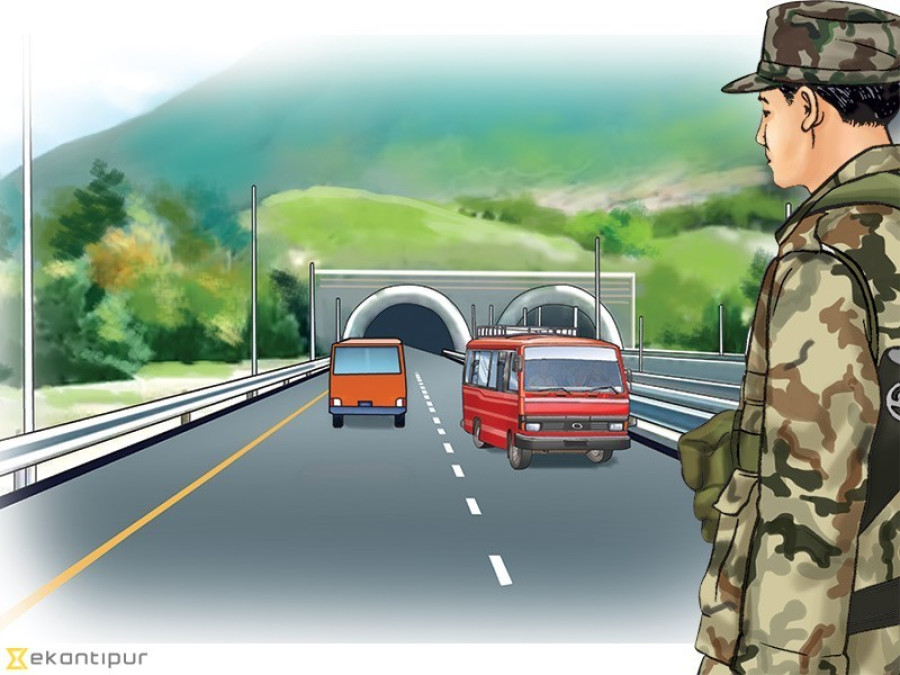Opinion
Life in the fast lane
The Nepal Army is overstepping its mandate, and the fast track has dissatisfied locals
Ayushma Basnyat
The Nepal Army— among major state organs like the executive, legislature, and the judiciary—was once known to be a relatively independent institution. But thanks to its growing involvement in commercial activities in recent years, it is getting embroiled in controversies. The Army operates FM radio stations, a mineral water plant and a medical college. It has been the subject of speculation over the procurement of helicopters, among other things. It has also has been tasked with the heavy responsibility of building a highway linking Kathmandu and Nijgadh, commonly known as the fast track.
The initiative to construct a 76-km expressway from Khokana at the southwestern edge of the Kathmandu Valley to Nijgadh in the Tarai plains is indeed noteworthy. The completion of the project could potentially mean that travel time between the two points would be reduced considerably. As such, the fast track initiative is said to link the hills and the Tarai not just ‘physically and economically’ but also ‘psychologically’.
Money matters
Although the basics have been established, there is a lot of confusion regarding the way the making of the fast track is unfolding. For one, there are speculations regarding the contract value of the project. The value estimated at Rs112 billion is reportedly 16 percent higher than the 2014 estimate made by the Asian Development Bank. And if we are to go by some latest reports, the Nepal Army is asking for more funds for this project.
The 92,000-strong national defence force is getting distracted from its core purpose—gathering intelligence, defending the country and its natural reserves, or engaging in disaster response. Deputy Executive Director Indra Kumari Adhikari of the Institute of Foreign Affairs, the author of Military and Democracy in Nepal, labels the Nepal Army as a ‘corporate army’ that has taken the form of a profit-making institution. To add to this, even members of the parliamentary State Affairs Committee have voiced concern over the increasing involvement of the Nepal Army in business-related activities.
The Nepal Army is overstepping its mandate, and the fast track initiative has dissatisfied a section of the Nepali population. Although, the project claims to connect people ‘psychologically’, simultaneously, it is displacing people too. For example, the residents of Khokana have been unanimously raising their voice claiming that there is a rising fear of displacement among locals. As the news media is replete with their concerns, Narendra Dangol, member of the public concern committee and a resident of Khokana, has been quoted as saying, “We have been forced to give our land to the government under the name of various projects, and we are likely to become landless squatters.” Therefore, the fear the resident have of internal displacement cannot be overstated.
In some cases, locals are receiving compensation for their land. Yet, many claim that the value they are getting is negligible compared to the current value. For the denizens of Khokana, the project, originally envisaged to bring people together, is ironically dislodging them from the place they call home and attacking their cultural heritage. And in doing so, it is ultimately jeopardising their identity. Although an often overlooked issue, the government needs to think how it will address this issue. It would be futile linking a part of the nation at the cost of displacing the another.
The fast track has already invited concerns over monetary and cultural issues. But they are deeply rooted in policy issues. The Nepal Army has frequently been cited as violating the Public Procurement Act, making the fast track project more obscure and opaque in the public eye. Officials overseeing the project have been quoted as saying that effectively following procurement laws means a delay in the timeframe of the development of the expressway. Essentially, they have been quoted justifying why the fast track initiative stands above procurement policies. This is true for most of the Nepal Army’s development projects. Indeed, on many occasions, the institution has been seen as a body above and beyond the law, begging the question: Is the Nepal Army’s purpose to contribute to the nation, or is it the nation’s purpose to contribute to the Nepal Army?
Bringing it together
The Nepal Army is correct in projecting the fast track as an ‘infrastructure of national pride’. To see it complete and comply with quality standards will be a matter of pride for us Nepalis. However, to ensure that the army’s actions live up to the projection, the institution needs to be transparent in its dealings. There have been recurrent calls for more transparency and decentralised leadership on matters of development funds, government budget and welfare funds in the Nepal Army. After all, can we really let national pride projects become a political fait accompli?
The Nepal Army is among the few institutions in the country that is in a position to bring about positive change if it so desires. Indeed, the institution needs to comply with the country’s governance mechanisms and avoid tarnishing its reputation any further. The Nepal Army needs to ensure that the fast track project is transparent and accountable to the public, to the nation, to the international community, and to the institution itself. The onus lies on the leadership to make this possible.
Basnyat holds an MSc degree from the University of Oxford.




 14.24°C Kathmandu
14.24°C Kathmandu











